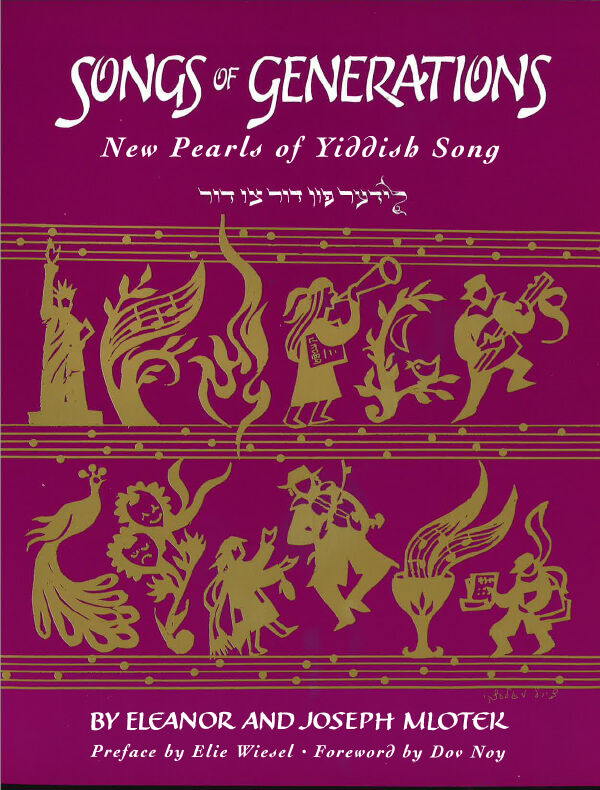Folksong. Variant text published by S. Ginzburg and P. Marek in 1901; text and music published by Platon Brounoff in 1911 and Y. L. Cahan in 1912. This version was published by Menakhem Kipnis in 1918. The song motif of the young man requesting permission to enter his lady love’s house was traced to the 16th century by folklorist Y. L. Cahan (see Cahan, Shtudyes). German and Czech parallels are cited by Cahan, 1912.
On the YIVO recording Folksongs in the East European Jewish Tradition, from the repertoire of Mariam Niremberg (1986), produced by Barbara Kirshenblatt-Gimblett, a drunken cardsharp is calling on Rifkele and threatens to poison himself if she won’t let him in: “Kh’hob moyre far dayn mamen. / Rifkele, efn mir / Anit vel ikh zikh farsamen.” In other songs of this type the girls’ names are variously Nekhamele, Brayndele, Khaye-Sorele, Shifkele, Rokhele.
S. Lehman published a variant in Arbet un Frayheyt, 1921, of a prisoner who says he will keep knocking on the iron door until he will be freed. Motl Zelmanowicz submitted a parody that was sung in the Jewish Labor Bund in Poland in the ’20s.Two parodies that were sung in the Lodz Ghetto were cited by Gila Flam. In one “Ver klapt do azoy shpet bay nakht? / Es klapt der geto hinger” (Who knocks so late at night? It is the Ghetto hunger), the plea is to “Open the provision store, it will make it easier.” The girl here fears “dem altn” (The Eldest of the Judenrat of the Ghetto Chaim Rumkowski).

Who’s that knocking so late at night?
Yankele Volyantshik?
Open, open, Brontshele,
I am your sweetheart!
How can I open it for you?
I’m afraid of my mother.
Open, open Brontshele,
I won’t stay long at all.
How can I open it for you?
I’m afraid of my father.
Open, open, Brontshele,
It won’t hurt you.
How can I open it for you?
I’m afraid of my sister.
Open, open, Brontshele,
It will be better for you.
How can I open it for you?
I’m afraid of my brother.
Open, open, Brontshele,
Don’t make a commotion.
How can I open it for you?
I’m afraid of my uncle.
Open, open, Brontshele,
I won’t come back later.
How can I open it for you?
I’m afraid of my aunt.
Open, open, Brontshele,
Otherwise, I won’t come back any more.
Ver klapt dos azoy shpet bay nakht?
Yankele Volyantshik?
— Efn, efn, Brontshele,
Ikh bin dayn kokhantshik!
Vi kon ikh dir den efenen,
Kh’hob moyre far mayn mamen.
— Efn, efn, Brontshele,
Kh’vel zikh gornisht zamen!
Vi kon ikh dir den efenen,
Kh’hob moyre far dem tatn.
— Efn, efn, Brontshele,
S’vet dir gornisht shatn
Vi kon ikh dir den efenen,
Kh’hob moyre far mayn shvester.
— Efn, efn, Brontshele,
S’vet zayn far dir beser!
Vi kon ikh dir den efenen,
Kh’hob moyre far mayn bruder.
— Efn, efn, Brontshele,
Makh nisht keyn geruder.
Vi kon ikh dir den efenen,
Kh’hob moyre far mayn feter.
— Efn, efn, Brontshele,
Kh’vel nisht kumen shpeter.
Vi kon ikh dir den efenen,
Kh’hob moyre far mayn mumen.
— Efn, efn, Brontshele,
Anit vel ikh mer nisht kumen. . .
װער קלאַפּט דאָס אַזױ שפֿעט בט נאַכט?
יאַנקעלע װאָליאַנטשיק?
— עפֿן, עפֿן, בראָנטשעלע,
איך בין דײַן קאַכאַנטשיק!
װי קאָן איך דיר דען עפֿענען,
כיהאָב מורא פֿאַר מײַן מאַמען.
— עפֿן, עפֿן, בראָנטשעלע,
כװעל זיך גאַרנישט זאַמען!
װי קאָן איך דיר דען עפֿענען,
כיהאָב מורא פֿאַר דעס טאַטן.
— עפֿן, עפֿן, בראָנטשעלע,
סיװעט דיר גאָרנישט שאַטן.
װי קאָן איך דיר דען עפֿענען,
כיהאָב מורא פֿאַר מײַן שװעסטער.
— עפֿן, עפֿן, בראָנטשעלע,
סיװעט זײן פֿאַר דיר בעסער!
ױ קאָן איך דיר דען עפֿענען,
כיהאָב מורא פֿאַר מײַן ברודערּ.
— עפֿן, עפֿן, בראַנטשעלע,
מאַך נישט קײן גערודער.
װי קאָן איך דיר דען עפֿענען,
כיהאָב מורא פֿאַר מײַן פֿעטער!
— עפֿן, עפֿן, בראָנטשעלע,
כיװעל ניט קומען שפּעטער.
װי קאָן איך דיר דען עפֿענען,
כיהאָב מורא פֿאַר מײַן מומען,
— עפֿן, עפֿן, בראָנטשעלע,
אָניט װעל איך מער נישט קומען. . .
Song Title: Brontshele

The Songs of Generations: New Pearls of Yiddish Song anthology comprises songs that were either never printed before or appeared in rare and inaccessible publications — sometimes in different versions and without proper sources. Most of the songs in this book were submitted by readers of Chana and Yosl’s column “Perl fun der yidisher poezye” (Pearls of Yiddish Poetry) in the Yiddish newspaper Der Forverts (The Forward), initiated in October, 1970. Over 25 years, thousands of songs were collected in correspondence and on cassettes from readers throughout the world, and they represent a veritable national Yiddish song archive. Chana Mlotek, in her introduction, writes, “In the course of years the inquiries, contributions and enthusiasm of these readers have kept our own interest unflagging and have reinforced our dedication to this effort. And in recent years our participants have also been augmented by new readers from the former Soviet Russia, who receive our newspaper there or from newly-arrived immigrants in this country and Israel.”